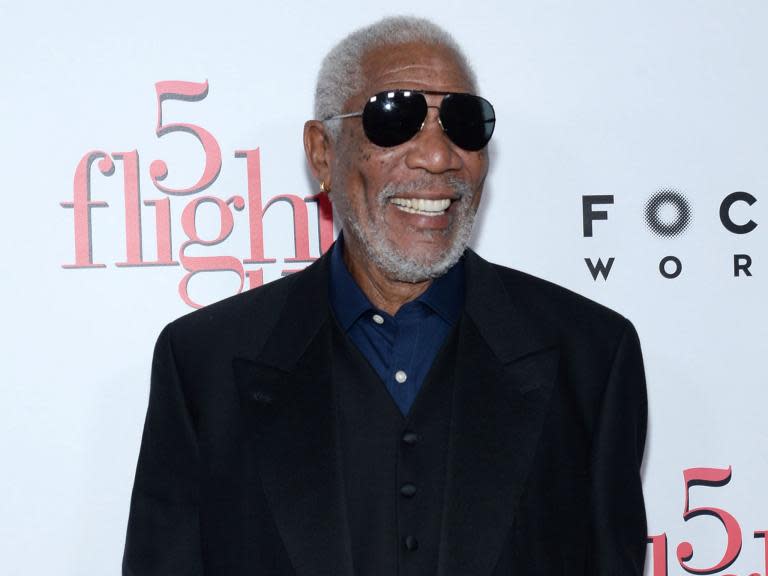Morgan Freeman has been accused of sexual harassment – so what else is new?
So Morgan Freeman joins the lengthy list of celebrities to be accused of sexual misconduct. My first reaction straddled the line of disbelief and disappointment: No! Not him, too!
Then I realised that I wasn’t surprised at all. Like most women, I’ve heard this too many times before – too many to count, it seems. A beloved celebrity whose work and supposed standup character you admire marred by allegations that he, too, is incapable – or unwilling – to behave.
Vox compiled a list of 220 people, almost exclusively men, who have been accused of sexual misconduct since last April. The list is so extensive that I’m in a constant state of surprise-not-surprised as I peruse it.
Where are the good men? Do none of them have a mother, sister, or a wife to answer to? Morgan Freeman was the “voice of God” – is every successful and powerful man like this?
A recent report published by Stop Street Harassment found that 81 per cent of women said they experienced some form of sexual harassment or assault in their lifetime. An American is sexually assaulted every 98 seconds. Nine out of 10 of these victims are women.
Sexual misconduct is an issue so common it’s dangerously close to being a non-issue. When experiencing some form of sexual misconduct is an everyday reality for millions of women, what’s the shocker when a mere 220 perpetrators are exposed? The Freeman allegations, you could say, are as insignificant and predictable as Trump’s latest tweet. It’s to be expected.
The numbers are even bleaker for women of colour. In the US, half of all multiracial women will experience some form of sexual violence in their lifetime. Only a mere fraction of them will actually report it.
Women of colour have long faced the challenge of being taken seriously. Take, for instance, the fact that African American activist Tarana Burke started the #MeToo movement in 2007. It only went viral after a slew of Caucasian celebrities piggybacked off Burke’s work, effectively hijacking the movement.
For some communities, a fear of stigma poses a barrier. In other cases, it’s the threat of retaliation. Women of colour and immigrant women make up a large portion of the low wage job force, meaning they likely lack legal protections, access to health insurance and paid time off, ultimately rendering them vulnerable to exploitation.
“Women of colour face both racial and sexualised harassment and assault. It stems from the historical context of their experiences,” says Dr Shruti Kapoor, founder and CEO of Sayfty. “For example, South Asian women have normalised marital rape in the name of culture and religion. Black women were routinely sexually assaulted during slavery. Because of gender stereotypes coupled with economic vulnerability, women of colour have always been more susceptible to sexual harassment and assault.”
Allegations such as those levied against Morgan Freeman also pose a unique dilemma for the same women, who, on one hand want to see their attackers punished, and on the other hand mourn a greater loss for their community when men like Cosby and Freeman are exposed.
The differentiation accusers made between sexual harassment and inappropriate behaviour is reminiscent of the debates that ensued after Babe published an interview with “Grace,” who recounted a date gone wrong with Aziz Ansari. For months, I heard arguments about whether Ansari was really at fault, with some hung up on why Grace didn’t say “no” firmly enough or leave earlier.
But therein lies another problem. As a society, we too readily dissect a situation in which a woman accuses a man of making unwelcome advances in the vain hope of proving she’s at fault. So much time is spent debating technicalities rather than simply accepting the statistical truth: it’s more likely that the woman is innocent. So instead of speaking up, many stay quiet.
I, too, can recall multiple instances when I struggled to say something when I felt uncomfortable by a man’s actions – wondering if my feelings were really warranted.
On one occasion, I sat uncomfortably on a plane as a large, elderly white man gripped the front and back of my aisle seat stretching and pushing his paunch into my space. Not wanting to “make a mountain of a molehill”, I convinced myself he didn’t realise he was invading my space. I, a staunchly feminist woman of colour, told myself I shouldn’t tell a man his behaviour was making me uncomfortable because he was old and white, and this is Trump’s America, and he’d stop eventually. And he did. But not until I deeply regretted splitting hairs between what was and wasn’t inappropriate, such that I convinced myself speaking up was a bad idea.
This is the everyday reality for women. Yet, far too many men still wonder why women are so jaded, why we so readily assume men are “pigs” with malintention. Without men changing the conversation, changing their behaviours and changing their expectations, we can’t change ours, either.
Without men contributing to change, women are perpetually stuck in a constantly desensitised state, in which sexual assault is the norm, and every guy, until proven otherwise, is a predator. Is that the world you want to raise your sons and daughters in?
If not, then wake up. Stop with the surprised reactions. Assault is the norm, not the exception. Once you understand that, you’ll see the world like women do: a very harsh and dangerous place.

 Yahoo News
Yahoo News 

